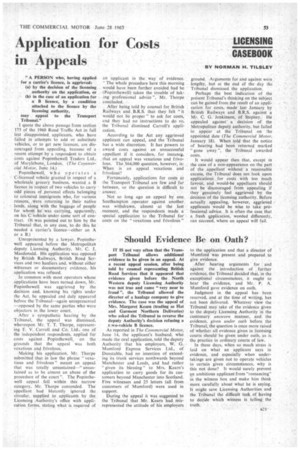Application for Costs in Appeals
Page 55

If you've noticed an error in this article please click here to report it so we can fix it.
"A PERSON who, having applied for a carrier's licence, is aggrieved:
(a) by the decision of the licensing authority on the application, or
(b) in the ease of an application for a B licence, by a condition attached to the licence by the licensing authority,
may appeal to the Transport Tribunal."
I quote the above passage from section 175 of the 1960 Road Traffic Act in full lest disappointed, applicants, who have failed in attempts to add or substitute vehicles, or to get new licences, are discouraged from appealing, because of a recent attempt by a respondent to obtain costs against Popinthewell Traders Ltd., of Marylebone, London. (The Commercial Motor, June 14.) Popinthewell, who operates a C-licensed vehicle granted in respect of a wholesale grocery business, wanted a B licence in respect of two vehicles to carry odd pieces of personal effects belonging to coloured immigrants who, for various reasons, .were returning to their native lands, along with the baggage of people for whom he was carrying, apparently, on his C vehicle under some sort of contract. (It was pointed out to him by the Tribunal that, in any case, to do this he needed a carrier's licence—either an A or a B.)
Unrepresented by a lawyer, Popinthewell appeared before the Metropolitan deputy Licensing Authority, Mr. C. J. Macdonald. His application was opposed by British Railways, British Road Services and two hauliers and. without either witnesses or documentary evidence, his application was refused.
In common with most operators whose applications have been turned down, Mr. Popinthewell was aggrieved by the decision and, knowing his rights under the Act, he appealed and duly appeared before the Tribunal—again unrepresented —opposed by the same parties who were objectors in the lower court.
After a sympathetic hearing by the Tribunal, the appeal was dismissed, whereupon Mr. T. T. Thorpe, representing F. V. Carroll and Co. Ltd., one of the independent respondents, applied for costs against Popinthewell, on the grounds that the appeal was both vexatious and frivolous.
Making his application, Mr. Thorpe submitted that in law the phrase "vexatious and frivolous" meant an appeal. that was totally unsustained—" unsustained as to be almost an abuse of the procedure of the court". The Popinthewell appeal felt within this narrow category, Mr. Thorpe contended. The appellant had blatantly ignored the circular, supplied to applicants by the Licensing Authority's office with application forms, stating what is required of an applicant in the way of evidence. " The whole procedure here this morning would have been further avoided had he (Popinthewell) taken the trouble of taking professional advice ", Mr. Thorpe concluded.
After being told by counsel for British Railways and B.R.S. that they felt "it wand not be proper" to ask for costs, and they had no instructions to do so. the Tribunal dismissed Carroll's application.
According to the Act any aggrieved applicant can appeal, and the Tribunal has a wide discretion. It has powers to award costs against an unsuccessful appellant if it considers. for instancg, , that an appeal was vexatious and frivolous. The 564,000 question, however, is: When is an appeal vexatious and frivolous?
Fortunately, applications for costs at the Transport Tribunal are few and far between, so the question is difficult to answer.
Not so long ago an appeal by one Southampton operator against another was withdrawn, almost at the last moment, and the respondents made a special application to the Tribunal for costs on the "vexatious and frivolous" ground. Arguments for and against were lengthy, but at the end of the day the Tribunal dismissed the application.
Perhaps the best indication of the present Tribunal's thinking on the subject can be gained from the result of an application for costs, made last January by British Railways and B.R.S. against a Mr. C. G. Jenkinson, of Steciney. He appealed against a decision of the Metropolitan deputy authority, but failed to appear at the Tribunal on the appointed date (The Commercial Motor, January 18). When told that the notice of hearing had been returned marked "gone away ", the Tribunal awarded costs.
It would appear then that, except in the case of a non-appearance on the part of the appellant without a reasonable excuse, the Tribunal does not look upon applications for costs with too much favour, and would-be appellants should not be discouraged from appealing if they genuinely feel aggrieved by the decision of the licensing authority. Before actually appealing, however, aggrieved applicants would be wise to take professional advice. It is often the case that a .fresh ipplication, worded differently, can succeed, where an appeal will fail.












































































































































